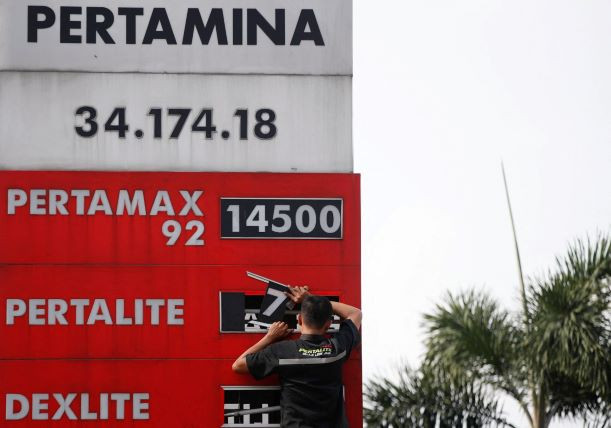Popular Reads
Top Results
Can't find what you're looking for?
View all search resultsPopular Reads
Top Results
Can't find what you're looking for?
View all search resultsExplainer: How the government ‘subsidizes’ unsubsidized fuel
After the recent fuel price hikes, some wonder why even supposedly unsubsidized gasoline in Indonesia is still priced far below global standards despite the high cost of oil imported to the country. And it has a lot to do with definitions.
Change text size
Gift Premium Articles
to Anyone
T
he government recently increased fuel prices to prevent an excessive burden on the state budget from subsidies aimed at keeping domestic fuel prices low despite high oil prices. However, some may wonder why even supposedly unsubsidized gasoline in Indonesia is still priced far below global standards. And it has a lot to do with definitions.
Earlier this month, the government decided in the face of ballooning energy subsidies to increase the price of fuels, including the unsubsidized Pertamax gasoline, so as to close the gap between retail prices and the economic prices and thereby alleviate the pressure on state coffers.
The move, which lifted the prices of state-owned oil and gas company Pertamina’s subsidized Pertalite gasoline and Solar diesel to Rp 10,000 and Rp 6,800 per liter, respectively, was announced by President Joko “Jokowi” Widodo on Sept. 3.
The price of the company’s high-grade RON-92 fuel Pertamax, meanwhile, rose to Rp 14,500 per liter.
Despite the increases, the gap between the retail prices and economic prices of Pertalite, Solar and Pertamax remains at Rp 3,150, Rp 7,950 and Rp 924, respectively, or 23.9, 53.9 and 6 percent of its economic price, Finance Ministry Fiscal Policy Agency (BKF) head Febrio Kacaribu explained during a hearing with the House of Representatives budget committee on Monday.
Pertamax is unsubsidized, according to law
Pertamax gasoline is categorized by Indonesian authorities as a General Fuel Type (JBU). Fuels in this category are not subsidized by the government, according to Presidential Regulation No. 191/2014 on fuel distribution, retail pricing and eligibility criteria for the purchase of subsidized fuel.
Energy and Mineral Resources Ministry Decree No. 62/2020 stipulates that the assigned business entity – in this case Pertamina – has the authority to determine for itself how it prices JBU fuel oil.
In a hearing with House Commission VI, which oversees trade, industry and state-owned enterprises (SOEs), Pertamina president director Nicke Widyawati said its price of Pertamax fluctuated based on changeable benchmark prices for crude oil, such as the Indonesian Crude Price (ICP).
However, she said Pertamina was still suffering “a loss”, since the gap between the Pertamax retail price and the economic cost was borne by the company, as opposed to Pertalite and Solar, where the gap was borne by the government.
“The government still controls [Pertamax’s price ceiling], because if the fuel were adjusted to the [current] market price, more [people] would use [the subsidized] Pertalite gasoline, risking more pressure on the [energy] subsidy budget,” she explained on Sept. 8.
“Given that Pertamax [is categorized as a] JBU, [its pricing] depends on Pertamina. [The government] just decides the [Pertamax] price ceiling,” the energy ministry's oil and gas director general, Tutuka Ariadji, said on Monday when asked whether the Pertamax price would come down once global oil prices declined.
Read also: Govt weighs $13b subsidy hike to keep fuel cheap
Policy changes
On March 10, the ministry chose Pertalite to replace Premium as a Special Assignment Fuel Type (JBKP) through Energy and Mineral Resources Ministry Regulation No. 37/2022, which means Pertalite may be subsidized by the government through a compensation scheme for Pertamina.
Ahmad Zuhdi Dwi Kusuma, an industry analyst at state-owned Bank Mandiri, explained that the Pertalite gasoline and Solar diesel were the only two subsidized transportation fuels in the country.
“Pertalite, as a JBKP, is subsidized using a compensation scheme. This means, for example, Pertamina sells the commodity below the economic price and afterward, the government covers the price gap in the form of a so-called compensation,” he said. “This compensation is usually not paid in the same year in full; it can be carried over to the next year.”
The subsidy scheme, on the other hand, was paid in advance, Zuhdi added. Terminology aside, transfers under both the compensation scheme and the subsidy scheme are, in fact, subsidies.
“As for Pertamax, it depends on Pertamina’s internal calculations, on the company’s strategy to effectively cover the price gap,” he told The Jakarta Post on Monday, adding that when Pertamax was sold below its economic cost, compensation for Pertalite could indirectly help plug the gap.
Read also: Pertamina raises Pertamax gasoline prices
The 2022 state budget allocates a total of Rp 502.4 trillion for energy subsidies and compensation, namely Rp 14.6 trillion for fuel oil subsidies, Rp 252.1 trillion for fuel oil compensation, Rp 134.8 trillion to subsidize 3-kg-LPG cylinders and Rp 100.6 trillion for electricity subsidies.
SOEs Ministry spokesman Arya Sinulingga said on March 29 that keeping unchanged the price of Pertamax – which then retailed at around Rp 12,500 – was like subsidizing luxury cars, as most Pertamax buyers were luxury car owners.
Pertamax accounts for 13 percent of total gasoline consumption in Indonesia, according to Pertamina data from 2020. Top-grade fuel Pertamax Turbo accounts for 1 percent, while the lowest-grade fuel Premium accounts for 23 percent and Pertalite – the most popular gasoline in Indonesia – accounts for 63 percent.
“Pertamina should calculate thoroughly so that it is no longer subsidizing luxury cars through Pertamax,” Arya said in a video statement.
Pertamina’s Nicke in a hearing with House Commission VI on March 28 asked lawmakers to support the oil and gas giant in bringing Pertamax retail prices closer to market prices. Commission VI deputy chair Aria Bima expressed the commission's backing for such a move “to guarantee Pertamina's financial health in executing government programs”.










